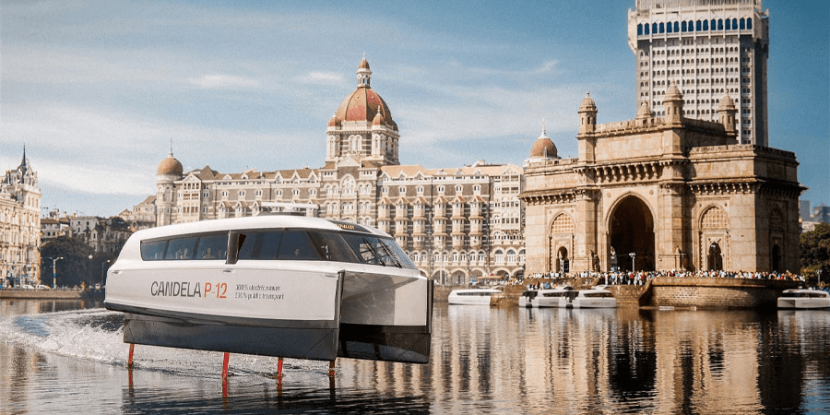In a much-awaited relief for commuters in Mumbai, a fleet of 11 hydrofoiling Candela P-12 commuter ferries are set to hit the waterways across Mumbai to reduce travel time and congestion.
Forming the nucleus of the city’s electric transport network, the urban mobility project will include thousands of vessels over the years. The ferries have been ordered by Mumbai-based operator, JalVimana.
Also Read: Shenzhen Approves Paid Driverless Robotaxi in Nanshan
“This is a groundbreaking project that unlocks the full potential of Mumbai's waterways for efficient commuting, and by investing in hydrofoil technology, the city is leapfrogging legacy waterborne transport systems,” said Gustav Hasselskog, Founder and CEO at Candela, a world leader in electric hydrofoil vessels. The Swedish marine tech company has been selected to spearhead this vision.
Mumbai, India’s financial capital, is one of the fastest-growing cities in the world. The Government of Maharashtra State has laid out a bold vision to revolutionize transport in the megacity by turning to its most underused asset: the sea. With over 23 million residents and overstretched roads, the state’s Ports Minister, Nitesh Rane, and Chief Minister, Devendra Fadnavis, recently announced that thousands of electric ferries will transform Mumbai’s waterways into high-speed arteries for clean, efficient transport.
Also Read: EHang’s Pilotless eVTOL Completes Inaugural Flight in Shanghai
The novel Candela P-12 uses computer-guided underwater wings to raise its hull above the water, slashing energy consumption, eliminating wake and slamming, and running silently, safely, and at a fraction of the operating cost of conventional diesel vessels. As a result, the P-12 has been hailed a “game changer” for waterborne transport.
The sale represents the largest single electric fleet deal in the world so far and will play a pivotal role in establishing Mumbai as a global leader in sustainable urban water transport. Mumbai is an ever-expanding city, which is partly built around a large bay. The first Candela P-12 vessels in Mumbai will serve the Gateway of India and Alibaug, a journey that typically takes two-to-three hours by car, and the Gateway of India to Elephanta Island. Another line is being planned by JalVimana to connect the new airport with central Mumbai to reduce travel time from 1 hour and 30 minutes to less than 30 minutes.
Also Read: IOH and Xanh SM Partner on Digital, Eco-Friendly Mobility Technology in Indonesia
“We believe Candela's next-generation P-12 will be a giant leap for Mumbai and towards our national goals of a sustainable future for our vast Indian coastline and inland waterways,” said JalVimana’s CEO, Niraj Thakur.
Following its debut in Stockholm in late 2024, where it slashed commute times and eliminated emissions, the P-12 has proven that electric ferries can be a transformative part of urban mobility, not just in Scandinavia, but globally.
The Mumbai Suburban Railway system, which includes both Central and Western Railways, carries approximately 6.8 million commuters daily. The Central Railway alone carries around 3.9 million commuters daily. This makes it one of the most intensively used mass transit systems in the world.

